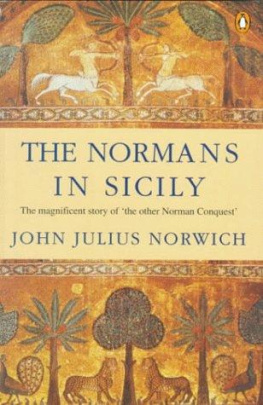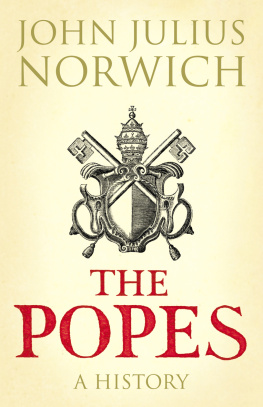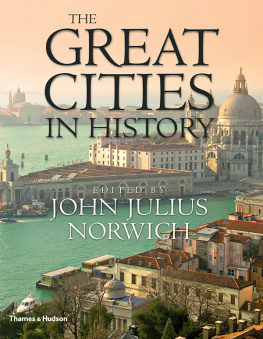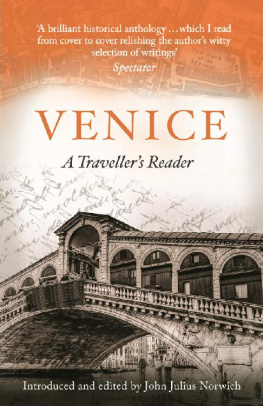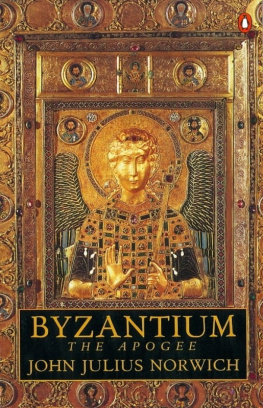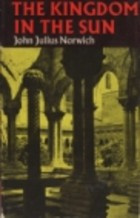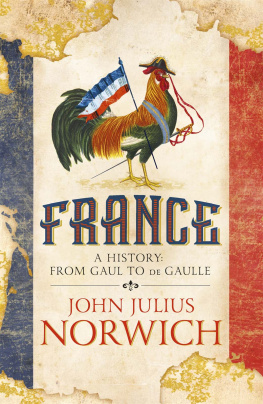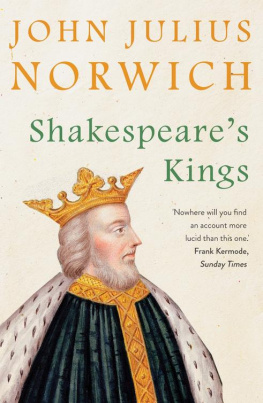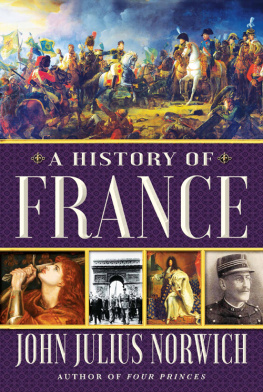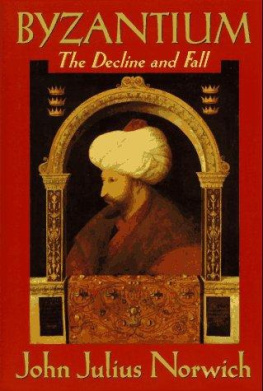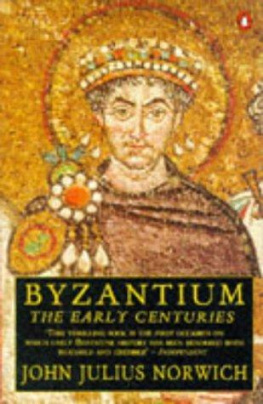John Julius Norwich - The Normans in the South
Here you can read online John Julius Norwich - The Normans in the South full text of the book (entire story) in english for free. Download pdf and epub, get meaning, cover and reviews about this ebook. year: 1967, genre: Detective and thriller. Description of the work, (preface) as well as reviews are available. Best literature library LitArk.com created for fans of good reading and offers a wide selection of genres:
Romance novel
Science fiction
Adventure
Detective
Science
History
Home and family
Prose
Art
Politics
Computer
Non-fiction
Religion
Business
Children
Humor
Choose a favorite category and find really read worthwhile books. Enjoy immersion in the world of imagination, feel the emotions of the characters or learn something new for yourself, make an fascinating discovery.
- Book:The Normans in the South
- Author:
- Genre:
- Year:1967
- Rating:3 / 5
- Favourites:Add to favourites
- Your mark:
- 60
- 1
- 2
- 3
- 4
- 5
The Normans in the South: summary, description and annotation
We offer to read an annotation, description, summary or preface (depends on what the author of the book "The Normans in the South" wrote himself). If you haven't found the necessary information about the book — write in the comments, we will try to find it.
The Normans in the South — read online for free the complete book (whole text) full work
Below is the text of the book, divided by pages. System saving the place of the last page read, allows you to conveniently read the book "The Normans in the South" online for free, without having to search again every time where you left off. Put a bookmark, and you can go to the page where you finished reading at any time.
Font size:
Interval:
Bookmark:
THE NORMANS IN THE SOUTH
THE NORMANS IN THE SOUTH 1016-1130
JOHN JULIUS NORWICH
Faber and faber
This edition first published in 2010 by Faber and Faber Ltd Bloomsbury House, 74-77
Russell Street London
All rights reserved John Julius Norwich, 1967
The right of John Julius Norwich to be identified as author of this work has been asserted in accordance with Section 77 of the Copyright, Designs and Patents Act 1988
This book is sold subject to the condition that it shall not. by way of trade or otherwise, be lent, resold, hired out or otherwise circulated without the publisher's prior consent in any form of binding or cover other than that in which it is published and without a similar condition including this condition being imposed on the subsequent purchaser
A CIP record for this book is available from the British library
isbn 978-0-571-15964-1)
For Anne
CONTENTS
Introduction
A cknowledgements
part one: the conquest
- Beginnings
- Arrival
- Establishment
- Sicily
- Insurrection
- The Newcomers
- Civitate
- Schism
- Consolidation
- Reconciliation
- Invasion
- Conquest
- Palermo
part two: the building of the kingdom
- Polarisation
- Excommunications and Investitures
- Against Byzantium
- From Rome to Venosa
- Victors and Vanquished
- The Great Count
- Adelaide
- The Fledgling Years
- Reunification
- Coronation
- Bibliography
- Index
No chapter of history more resembles a romance than that which records the sudden rise and brief splendour of the house of Hauteville. In one generation the sons of Tancred passed from the condition of squires in the Norman vale of Cotentin, to kinghood in the richest island of the southern sea. The Norse adventurers became Sultans of an Oriental capital. The sea-robbers assumed together with the sceptre the culture of an Arabian court. The marauders whose armies burned Rome received at papal hands the mitre and dalmatic as symbols of ecclesiastical jurisdiction.
john addington symon ds,
Sketches in Italy and Greece
INTRODUCTION
In October 1961 my wife and I went on a holiday to Sicily. I think I was vaguely aware that the Normans had ruled there some time in the Middle Ages, but I certainly knew very little else. At any rate I was totally unprepared for what I found. Here were cathedrals, churches and palaces which seemed to combine, without effort or strain, all that was loveliest in the art and architecture of the three leading civilisations of the timethe North European, the Byzantine and the Saracen. Here, in the dead centre of the Mediterranean, was the bridge between North and South, East and West, Latin and Teuton, Christian and Muslim; superb, unanswerable testimony to an age of tolerance and enlightenment on a scale unknown anywhere else in mediaeval Europe and, even in succeeding centuries, seldom equalled. I became very over-excited and longed to know more. The holidays over, I took the only sensible course and made straight for the London Library.
I was in for a sad surprise. A few works, mostly in French or German, of formidable nineteenth-century scholarship and paralysing dullness, lurked on an upper shelf; but for the ordinary English reader, seeking merely a general account of Norman Sicily, there was practically nothing. For a moment I almost wondered whether that most invaluable and trustworthy of all English institutions had let me down at last; at the same time, I knew perfectly well that it hadn't. If the London Library did not possess the sort of book I wanted, it could only be because no such book was in existence. And so it was that I first came face to face with a question which, after five years, still has me baffled: why is it that one of the most extraordinary and fascinating epics of European history between the ages of Julius Caesar and Napoleon should be so little known to the world at large ? Even in France any reference to the subject is apt to be greeted by a blank expression and a faintly embarrassed silence; while in England, which after all suffered a similarthough far less excitingNorman conquest of its own at almost exactly the same time and was later to provide Sicily with several statesmen and even a queen, the general bewilderment seems to be yet greater. M. Ferdinand Chalandon, author of the still definitive work on the period, included in his monumental bibliography of well over six hundred items only one English author, Gibbon; and though in the sixty intervening years this country has produced a number of scholars, magnificently led by Miss Evelyn Jamison, who have hacked out many a clearing and planted their flags in the darker corners of the forest, to this day I know of only two non-specialist works in English which tell even part of the story in any detail: E. Curds's Roger of Sicily, written with a conscientious if somewhat heavy hand shortly before the First World War, and The Greatest Norman Conquest there's a give-away title if you likeby Mr J. Van Wyck Osborne, whose thoughtful scholarship is endlessly sabotaged by the exuberance of his imagination. Both these books, incidentally, were published in New York; both are long out of print; and neither covers the whole period.
The conclusion was inescapable: if I wanted a complete history of Norman Sicily in English for the average reader, 1 should have to write it myself. And that is how it comes about that I now put forward, gingerly and with much diffidence, the first of two volumes which will together carry the story through from the first day, in 1016, when a party of Norman pilgrims was accosted in the shrine of the Archangel Michael on Monte Gargano, to the last, a hundred and seventy-eight years later, when the brightest crown of the Mediterranean passed to one of the blackest of the German Emperors. The present volume covers the first hundred and fourteen of those years and closes on Christmas Day 1130, when Sicily at last became a kingdom, and Roger II her king. They are the epic years, the years of endeavour and conquest, dominated by the sons and grandsons of Tancred de Hauteville and, above all, by the lowering bulk of Robert Guiscard, one of history's few military adventurers of genius to have started from nothing and died undefeated. Thereafter the mood changes; northern harshness softens in the sun; and the clash of steel slowly dies away, giving place to the whisper of fountains in a shaded patio and the ripple of plucked strings. Thus the second volume will tell of the golden age of Norman Sicily, the age of Cefalu, of Monreale and the Palatine Chapel at Palermo; and then, sadly, of its decline and collapse. True, its spirit was to live on for another half-century in Frederick II, Stupor Mundi, the greatest of Renaissance princes two hundred years before his time, and in his lovely son Manfred. But Frederick, though a Hauteville on his mother's side and by his upbringing, was also a Hohenstaufen and an Emperor. His is a glorious, tragic story; but it is not ours.
This book makes no claim to original scholarship. Apart from anything else, I am no scholar. Despite eight years of what is still optimistically known as a classical education and a recent agonising refresher course, my Latin remains poor and my Greek worse. Though I have all too often had to struggle through contemporary sources in the original, I have gratefully seized on translations wherever they have been available and duly noted them in the bibliography; and though I have tried to read as widely as possible around the subject so as to fit the story into the general European context, I do not pretend to have unearthed any new material or to have put forward any startlingly original conclusions. The same goes for fieldwork. I think I have visited every site of importance mentioned in this book (many of them in unspeakably adverse weather) but my researches in local libraries and archives have been brief andexcept in the Vaticanlargely unfruitful. No matter. My purpose was simply, as I have said, to provide ordinary readers with the sort of book I wished I had had on my first visit to Sicilysomething that would explain how the Normans got there in the first place, what sort of a country they made of it, and how they managed to imbue it with a culture at once so beautiful and so unique. Pausing now for breath, I only wish that I could do them greater justice.
Font size:
Interval:
Bookmark:
Similar books «The Normans in the South»
Look at similar books to The Normans in the South. We have selected literature similar in name and meaning in the hope of providing readers with more options to find new, interesting, not yet read works.
Discussion, reviews of the book The Normans in the South and just readers' own opinions. Leave your comments, write what you think about the work, its meaning or the main characters. Specify what exactly you liked and what you didn't like, and why you think so.

